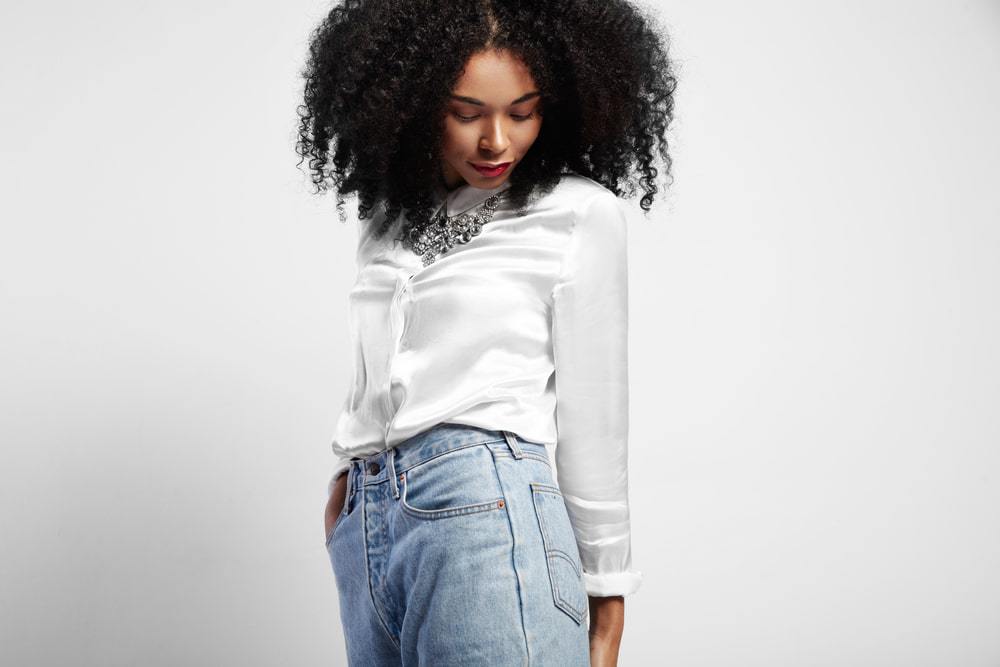
Advertising is often an exercise in taking sweet lies as sweetly as possible. Everyone likes to see themselves in the best possible light, and commercials and ads are glad to offer rose-tinted glasses through which to see ourselves and our hair products.
Chief among these are shampoo commercials. We’ve all seen the models in these commercials improbably glamorous and impossibly happy while lathering their hair with the latest finely-scented scintillating shampoo and conditioner.
However, in those commercials, something you never see is shampoo products that have turned into a hardened blob gumming up someone’s hair, leaving it looking and smelling like skid marks on the inside of a sewer pipe.
That’s the sight (and smell) that may come to mind when you think of expired shampoo.
We all know what milk looks and smells like when it goes bad, but what happens when good shampoo goes bad – and just how likely is that, anyway?
Let’s “milk” this question a bit more and see the secrets your shampoo bottle may be hiding and how you can avoid the mother of all bad hair days.
Table of Contents
- 1 Does Shampoo Expire?
- 2 The Shelf Life of Hair Shampoo
- 3 How Long Does Shampoo Last Before It Expires?
- 4 Is Expired Shampoo Bad for Your Hair? Is It Dangerous?
- 5 How Can You Make Shampoo Last Longer?
- 5.1 How Long Does Shampoo Last Unopened?
- 5.2 What Happens if You Use Expired Shampoo?
- 5.3 How Long Is Shampoo Good for After Its Expiration Date?
- 5.4 Is Shampoo Good After 5 Years?
- 5.5 When Does Dry Shampoo Expire?
- 5.6 When Does Baby Shampoo Expire?
- 5.7 Is It Ok to Use Expired Shampoo?
- 5.8 How Can You Tell if Shampoo Is Expired?
- 5.9 Can Expired Shampoo Cause Hair Loss?
- 5.10 Does Purple Shampoo Expire?
- 5.11 Related Articles
- 5.12 Always Check Your Shampoo's Expiration Date
Does Shampoo Expire?
Shampoo expiration dates are typically marked on the bottle as 12 months "12M", 18 months "18M", or 24 months "24M". An unopened shampoo bottle can last up to three years, but once opened, the expiration clock speeds up, often cutting the expiration date in half to 18 months at most.
Expired shampoo can have a strange odor, texture, and color, and using it can cause scalp irritation, dandruff, dryness, and even hair loss over time. It's crucial to check the label for the expiration date before using the shampoo, and always err on the side of caution.
If the shampoo is past its expiration date or shows any signs of spoilage, including clumping, discoloration, separation, stickiness, or poor lathering, it's best to dispose of it and replace it with a new bottle to ensure healthy and clean hair.

The Shelf Life of Hair Shampoo
The shelf life or expiration date of a bottle of shampoo, similar to other hair care products, is directly connected to the hair product's ingredients.
The Expiration Date Depends on the Product's Ingredients
A bottle of shampoo can contain many different ingredients, including the following:
Sodium Lauryl Sulfate (SLS)
Sodium Lauryl Sulfate, sometimes written as SLS, is a surfactant, which means this is a cleaning agent. This chemical compound is partly responsible for the foamy nature of your soap lather, but it can also strip away essential oils from your scalp and irritate your skin.
Also, they can sometimes be harsh enough to cause your hair color to fade. Many people avoid sulfate shampoos altogether due to concerns about hair loss and breakage.
Sodium Laureth Sulfate (SLES)
Sodium Laureth Sulfate, which is closely related to SLS, is often gentler and less prone to causing irritation.
Cocamidopropyl Betaine (CAPB)
Cocamidopropyl Betaine is a gentler version of SLS and Sodium Laureth Sulfate.
Dimethicone (or Polydimethylsiloxane)
Dimethicone is a silicone polymer that can help smooth your hair.
Panthenol (or Pantothenol)
Panthenol, which is an example of Vitamin B5, is essential for moisturizing and conditioning your hair.
Parabens
Parabens (preservatives) such as methylparaben, ethylparaben, and butylparaben can help prevent mold and bacterial growth but can also have estrogen-like effects.
When used in excessive amounts, these parabens can lead to cancer. However, Parabens’ estrogen-like effects tend to be even weaker than those of soy, which itself is nowhere near enough to cause you any harm.
Zinc Pyrithione (or Pyrithione Zinc)
Zinc Pyrithione can help combat dandruff, slowing skin cell production and flaking.
In addition, shampoos can often include extra ingredients such as citric acid or essential oils that are common in everyday life and can help your hair in various ways, from making it smoother and softer to soothing your scalp to stimulating growth.
While the public often views ingredients such as SLS as toxic, studies have shown that SLS can be safe for human use within an acceptable range.
What SLS and these other ingredients are not, however, is immortal. They and the mixtures within shampoo can break down over time, meaning that, yes, shampoos can go bad and expire.

How Long Does Shampoo Last Before It Expires?
Take a look at your shampoo bottle or any other personal care products you own. Do you see a marking that says “12M” or “24M?” If so, then that probably means what you may already be inclined to think it means – that your shampoo can last for 12 or 24 months before it goes bad.

Is Expired Shampoo Bad for Your Hair? Is It Dangerous?
This question may not be as easy to answer as you might think. On the one hand, you may be inclined to think that it’s “just shampoo” and that in the absence of any “Best Used By” date, it can’t do too much harm to your body if you use it when it’s just a “little” expired.
On the other hand, you may go completely the other way and fear the kind of infections or odious results that can arise from using expired makeup.
Both cases have arguments in their favor when it comes to expired shampoo.
An expired shampoo isn’t something you want to have around, but it doesn’t magically go from fine to toxic when it passes the 12, 18, or 24-month mark. As with makeup, food, and other products that degrade and spoil over time, a product's quality can degrade gradually, so these timelines are more of a guideline.
These months aren’t magical expiration dates after which your shampoo immediately turns rancid, but by the same token, if it starts to seem or smell off before those month markers, you should ditch it sooner rather than later.
Finally, some shampoos have preservatives that can potentially cause them to last longer. However, preservatives and more chemically-based shampoos have gone out of fashion in recent years in favor of more organic shampoos.

What Are the Warning Signs?
As with everything else organic, these shampoo formulas can start to decay, and when they do, they display warning signs that should immediately mark them as expired.
1. Unusual Odor
This is by far the most obvious sign that something’s gone very, very wrong with your shampoo. As alluded to above, shampoo companies go out of their way to market their shampoos as the most fragrant substances imaginable.
If yours starts to smell off or even starts to turn rancid, chances are it’s well past its prime. Even if you aren’t an expert on scalp and hair hygiene, you probably don’t want something as odious as that mixed into your hair.
There’s a reason we say things are suspicious if they “don’t pass the smell test,” so if your shampoo has a foul smell, it’s a clear sign you should junk it immediately.
2. Clumping Together
Think about how smoothly shampoo typically pours out of the bottle. Think of its texture. If something is off with the texture and, instead of a smooth, creamy mixture, you get something that comes out in clumps, chances are the shampoo has expired.
3. Discoloration
Does the shampoo look yellowish where it didn’t before? Is it at all discolored or different from its natural color? If the answer to either is yes, there’s a good chance that your shampoo has gone bad.
4. Starting to Separate
Shampoo should come out in a single, smooth texture. If the solution starts to separate into a more watery part and a more solid part, there’s a good chance that it’s started to spoil and should be tossed.
5. Feels Sticky
Feeling sticky, like having a foul odor, is one of the most prominent indicators that your once-good shampoo has gone wrong.
You don’t want your hair feeling like a sticky mess, so unless you love the texture of maple-syrup-meets-gum in your hair, stickiness is a surefire sign that it’s time to throw out your spoiled shampoo.
6. Doesn’t Lather Well
If the smell and texture aren't as conclusive as you’d like, try lathering the shampoo. You know what a good soapy lather looks like, so if your shampoo doesn’t lather well, chances are it’s starting to go bad.

How Can You Make Shampoo Last Longer?
There are several ways to increase your shampoo’s shelf life, starting with simply closing the lid when you aren’t using it.
This should be relatively obvious, but the more you leave the lid open, the longer you expose all of those aforementioned chemicals and biodegradable ingredients to the oxygen and other elements surrounding it, which can cause it to degrade faster.
You wouldn’t leave a food container open in a non-refrigerated setting, and the same holds true for shampoo. Leaving your shampoo open leads to a shorter shelf life.
Likewise, you’ll want to keep it away from direct sunlight or heat, both of which can cause bacteria to grow or accelerate the growth of any already present.
Instead, it would be best if you stored your shampoo in a dark, cool place – which shouldn’t be too hard given that bathroom cabinets typically fit that description. We also recommend storing shampoo bars in a dark, cool place too, even though they often don't have specific shelf lives.
How Long Does Shampoo Last Unopened?
Shampoo can expire, and the shelf life of shampoo depends on the ingredients, the brand, and how it is stored. Generally, shampoo can last up to three years unopened, and it is important to store it in a cool and dry place away from direct sunlight. Check the expiration date printed on the bottle before use.
What Happens if You Use Expired Shampoo?
Using expired shampoo can have many negative effects, so be mindful of the expiration date. Over time, the active ingredients in the shampoo break down and lose their effectiveness. Expired shampoo also can have a strange odor and consistency. Using expired shampoo can irritate your scalp and cause hair to become dry, brittle, and prone to breakage.
How Long Is Shampoo Good for After Its Expiration Date?
Shampoo is typically good for about six months after its expiration date. However, this can vary depending on the brand and the ingredients. Some shampoos may last longer than six months, while others may lose effectiveness sooner. It is best to check the label and always err on the side of caution if you're past the expiration date.
Is Shampoo Good After 5 Years?
Shampoo is not good after five years, even if it is unopened. After five years, the shampoo can lose its effectiveness, and the active ingredients can break down, making it less effective in cleaning your hair. The texture and scent of the shampoo may also change, and it can become a breeding ground for bacteria and other harmful microorganisms.
When Does Dry Shampoo Expire?
Dry shampoo usually lasts for about two years, but this can vary depending on the brand and the ingredients. It is important to check the expiration date on the bottle before using it. Expired dry shampoo can cause scalp irritation and hair damage, and it may not be effective in absorbing excess oil or refreshing your hair.

When Does Baby Shampoo Expire?
The shelf life of baby shampoo is typically around two to three years. However, this depends on the brand and the ingredients. It is important to check the expiration date on the bottle before using it. Expired baby shampoo can cause scalp irritation and dryness and will be less gentle and nourishing for a baby's delicate scalp and hair.
Is It Ok to Use Expired Shampoo?
You shouldn't use expired shampoo as it can have negative consequences for your hair and scalp. Expired shampoo can lose its effectiveness and may contain harmful bacteria that can cause scalp irritation, dandruff, and even hair loss. It is better to replace expired shampoo with a new one to ensure that you are using a safe and effective product.
How Can You Tell if Shampoo Is Expired?
There are several signs that indicate that the shampoo has expired. The first sign is a change in texture and consistency. Expired shampoo may become thicker or thinner than its original consistency, making it difficult to lather and apply. Also, shampoo that has expired may have a strange odor or color that is different from its original form.
Can Expired Shampoo Cause Hair Loss?
While using expired shampoo may not necessarily cause hair loss, it can contribute to hair damage and scalp irritation, which can lead to hair loss over time. Expired shampoo can also create many harmful bacteria that can affect the health of your hair and scalp. It's best to replace expired shampoo with a new one to ensure healthy hair.
Does Purple Shampoo Expire?
Purple shampoo can expire like any other shampoo. Purple shampoo is typically used to tone and maintain the color of blonde or gray hair, and using expired purple shampoo can result in unwanted color changes or damage to your hair. It is important to use fresh and effective hair care products to keep your hair looking its best.

Always Check Your Shampoo's Expiration Date
When first faced with the prospect of your shampoo spoiling, it can be all too easy to panic. The last thing you want is to accidentally use bad, bacteria-laden shampoo and leave your scalp open to infection or cause your hair to become a sticky, smelly mess.
Thankfully, however, those last two points make expired shampoos quite easy to detect. As long as you give your shampoo a good whiff, lather it up, and make sure that there’s nothing wrong with its scent or texture, chances are it’s good to go.
Check how long the bottle says it’s good for, and store it out in a cool, dark, climate-controlled spot. Doing all of this may not make you as absurdly happy as the models in those shampoo and conditioner commercials, but it can keep your bottle smelling and feeling fresher for longer.




